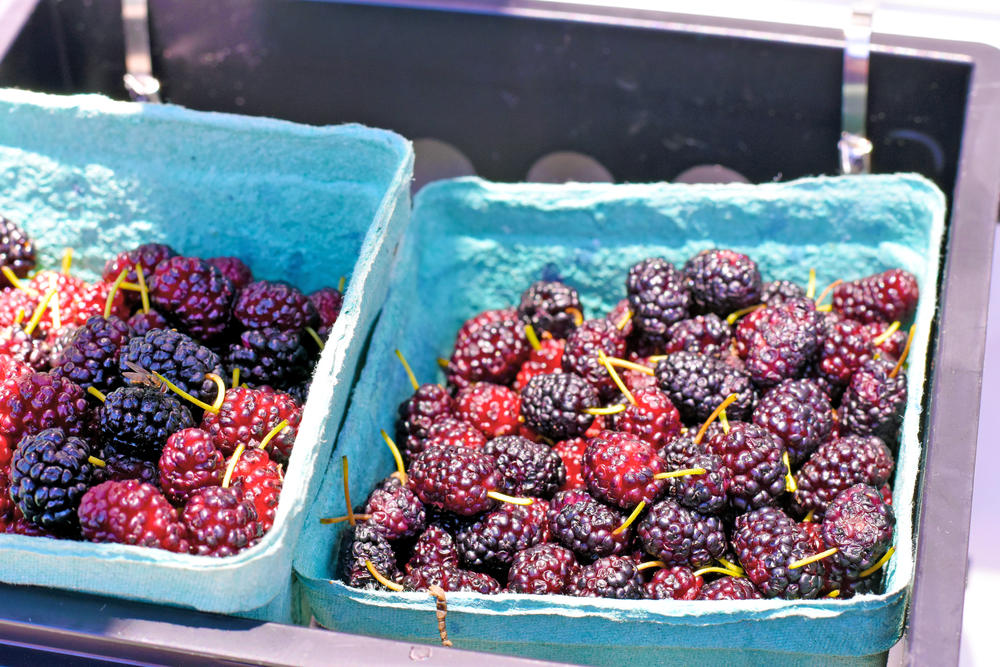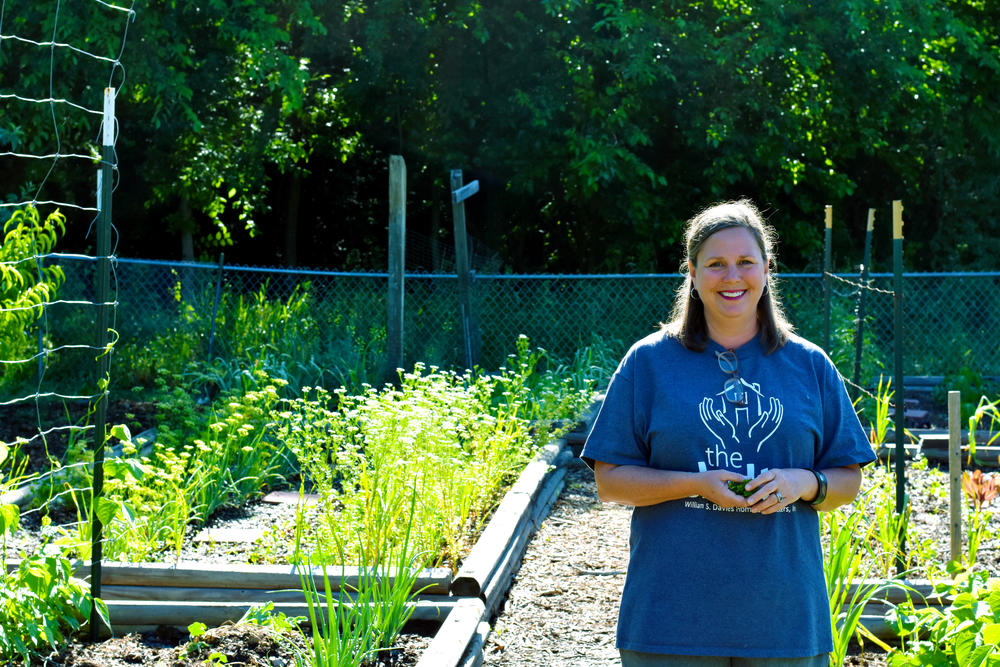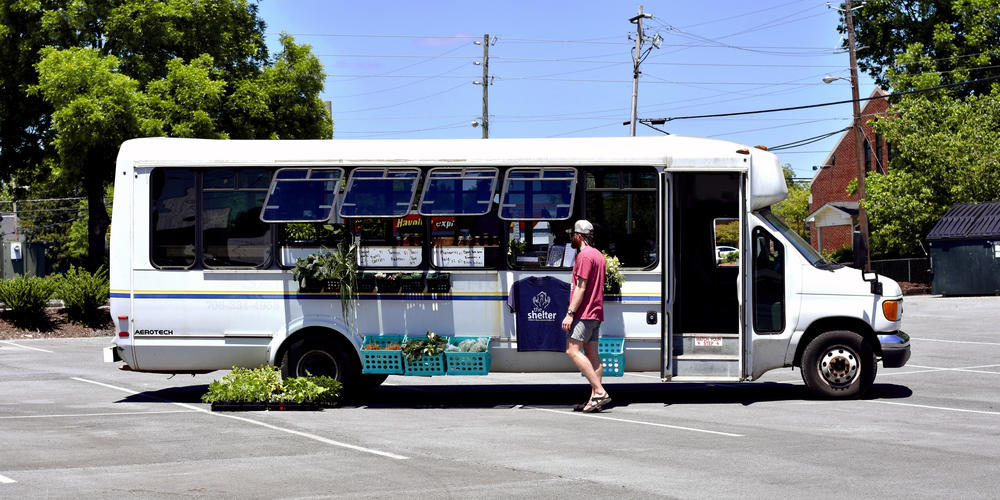Section Branding
Header Content
A Farm, A Bus And A Fight Against Hunger In Rome
Primary Content
In Rome, a men’s homeless shelter has been cultivating a backyard farm with a variety of veggies to feed its residents.
The shelter has been so successful, they’re looking to share, bringing fresh food to the northwest Georgia community in a tricked-out school bus.
Birds are chirping, chickens are clucking and a light breeze is blowing on a man gesturing to a small urban farm protected by a fence.
“We’re out here enjoying the backdoor of nature,” Lewis said, taking in the sunshine and a not-insignificant amount of pollen.
He’s a resident at the William S. Davies homeless shelter in Rome, about 70 miles northwest of Atlanta, and is using only his first name to describe his life at the shelter.
Lewis has done some work on the farm, like putting up fence posts, and likes that the vegetables are fresh and tasty (he recently discovered he’s a fan of eggplant) additions to meals at the 16-bed shelter.
MORE FROM OUR FULL PLATES SERIES:
- Georgia First In Nation To Tackle Senior Hunger Head On
- How Savannah City Planners Hope To Attract Grocery Stores
- How Picky Eaters Can Help Hungry Classmates On The Weekend
- Grant Brings Fresh Produce To UGA Student Pantry
Another resident, Eddie, says the benefits of the farm behind the shelter are twofold.
“It’s a great feeling for us getting the nutrition that we need,” he said. “but it also benefits the community to help firm this foundation and help the next generation.”
That’s because there’s more lettuce and carrots and other vegetables than the shelter needs to feed the men that live there. Shelter executive director Devon Smyth got an idea: take the excess and sell them in places around Rome where getting fresh food is difficult.
As we walk past the chickens and Blackberry the rabbit, Smyth tells me the farm and the idea for the Farm Bus reminds her of a biblical Hebrew term “adamah,” or “earth.”
“We talk theologically in my framework that what we eat sustains us to do the work we’re called to do in the world,” Smyth said. “So if we reshape what we eat and how we eat, that connects us more intentionally with the creator God.”
She’s a deacon in the Methodist Church, and continues to waxes theological about the shelter’s foray into feeding more people.
“It’s offering the ‘holy’ out into the world: we have this gift that we’ve been given and this opportunity to grow good food…” she said. “We feel like we’re not just taking food out, but we’re reshaping the way our community eats.
To Smyth, expanding access to food in Rome is more than an idea – it’s a literal offering to be made, and in Rome there are plenty of places that need it.
THE FARM
Down some wooden steps to the back side of the property, farm manager Emmie Cornell is exploring the literal side of “adamah,” deftly digging in the dirt to unearth vegetables will be sold later that day on the bus.
Cornell is in her early 20s and a recent graduate of Berry College, and has been a driving force in transforming a large patch of dirt and concrete into a thriving urban farm.
In between snapping snow peas and grabbing bok choi, Cornell explains the finer points of trap cropping (learned at the Georgia Organics conference) and her crop rotation (the snow peas fix the nitrogen in the soil that were taken by last year’s tomatoes and squash) that has boosted the output of the raised planting beds to supply the Farm Bus.
Looking at the map, the city of Rome does have grocery stores – IGA, Aldi, Kroger, Publix and the like, but not every neighborhood has the same access.
“There are pockets like Maple Avenue,” Cornell said, referring to the main road next to the shelter, “where there are a couple convenience stores, and there’s really no place to get fresh food.”
In fact, less than a mile down the road from Davies on Maple Avenue sits an empty Rite Aid that once upon a time housed a Piggly Wiggly, a boarded-up brick and mortar monument to shrinking access to fresh food.
According to the USDA, many parts of the city are considered to be a food desert – a low income area and no close access to a supermarket with fresh food.
THE FARM BUS
The Davies Farm Bus looks like your run-of-the-mill mode of transit as it lumbers down quiet Rome streets.
Smyth said the inspiration for the Farm Bus came from a similar project she saw when living in Savannah, where an old Colonial Bread Truck became a rolling farmers market in that community.
Students at Berry College tweaked this one-time school bus to fit the Davies shelter’s needs – adding metal brackets on the outside to hold baskets, replacing seats with a sturdy countertop and shelves and making sure the windows open outward so you can see the fresh fare.
Everything about the Farm Bus is done with careful intention, Smyth said, including where it parks.
During the first run in early May, the bus sold, thanks in part to its parking spot next to an elementary and middle school pickup line.
“So now we’re trying it here at Trinity United Methodist Church on the corner of Avenue A and 5th Ave.,” Smyth explains. “This is on a bus line on purpose… We have it where folks who might be coming by on the bus or on foot [can see because] it’s a pretty high-trafficked walking path.”
It’s still a new undertaking, and the staff is relying on both word-of-mouth and the sight of a bus covered in vegetables to get peoples’ attention – and some new logos and signage are almost complete.
Emmie Cornell, the young farm manager, says with time she hopes the impact of the Farm Bus continues to grow beyond the shelter and curious passers-by.
“I think people will come to recognize it and see it in the community and know that it is full of local produce and local products,” she said. “Supporting the shelter, but also local producers and other farmers around Rome.”
The Farm Bus is gearing up for a busy summer, planning to go out Tuesdays and Thursdays across the city in places where fresh food is scarce.






